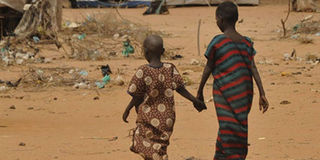UN cuts food aid for 500,000 refugees in Kenya

Refugees at the Daadab camp in Kenya. A shortfall in donor assistance is forcing a 20 per cent reduction in food rations for refugees in the Dadaab and Kakuma camps in Kenya, the United Nations said on Thursday. FILE
A shortfall in donor assistance is forcing a 20 per cent reduction in food rations for refugees in the Dadaab and Kakuma camps in Kenya, the United Nations said on Thursday.
The cutback, which is taking effect on Friday, means that the 535,000 mainly Somali refugees in the camps will no longer receive the recommended minimum daily intake of calories, UN relief groups noted.
“We have done everything possible to avoid this, but it has become necessary to reduce ration sizes by 20 per cent in November and December in order to stretch our existing food stocks to last through the end of the year,” said Ronald Sibanda, Kenya country director for the World Food Programme (WFP).
“We hope this will be a temporary measure as we appeal to donors to come to the assistance of the hundreds of thousands of refugees who rely on WFP to meet their daily food needs.”
Contributions to the feeding effort in the Kenya camps are currently running below the $10 million needed every month to sustain the programme, the UN said.
Aid workers are also grappling with what the UN has called "an explosive outbreak" of polio in the Dadaab complex.
A dozen cases of the disease were confirmed among refugees in August.




